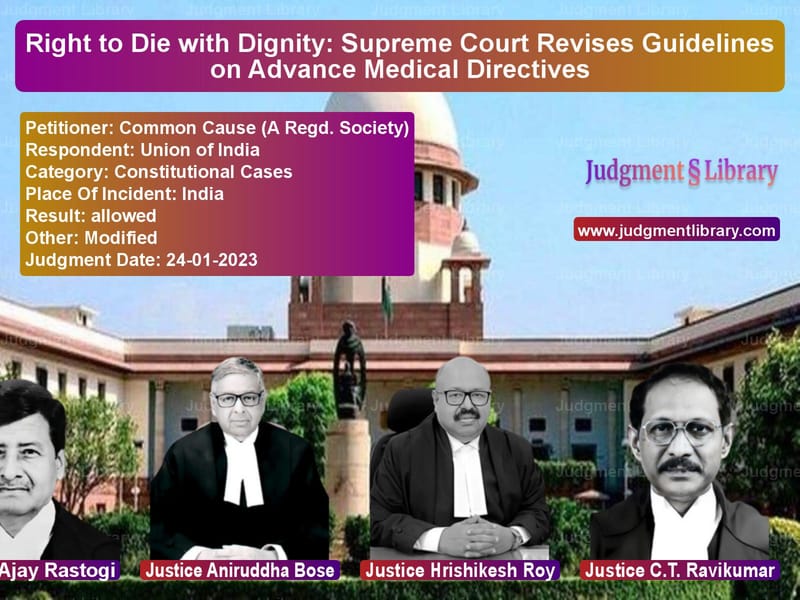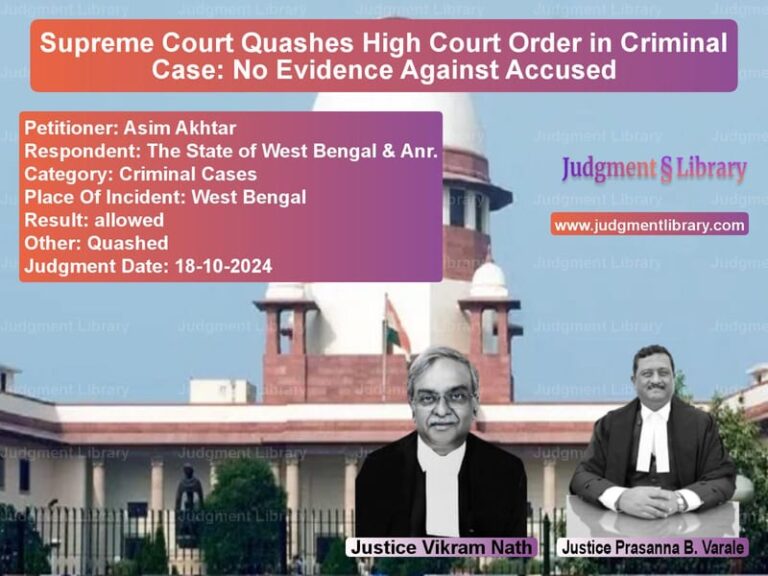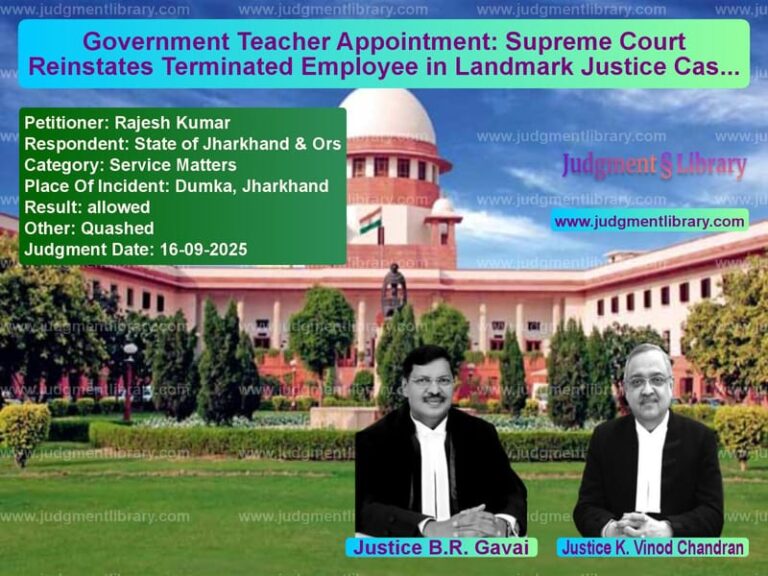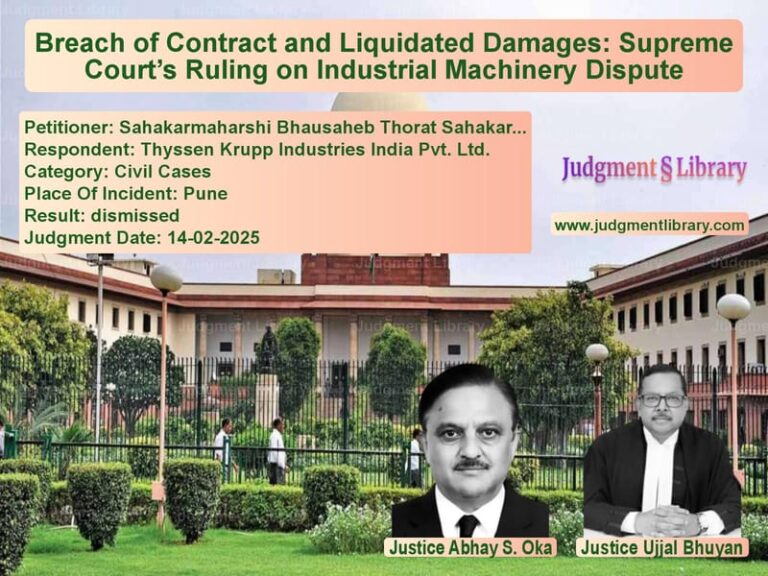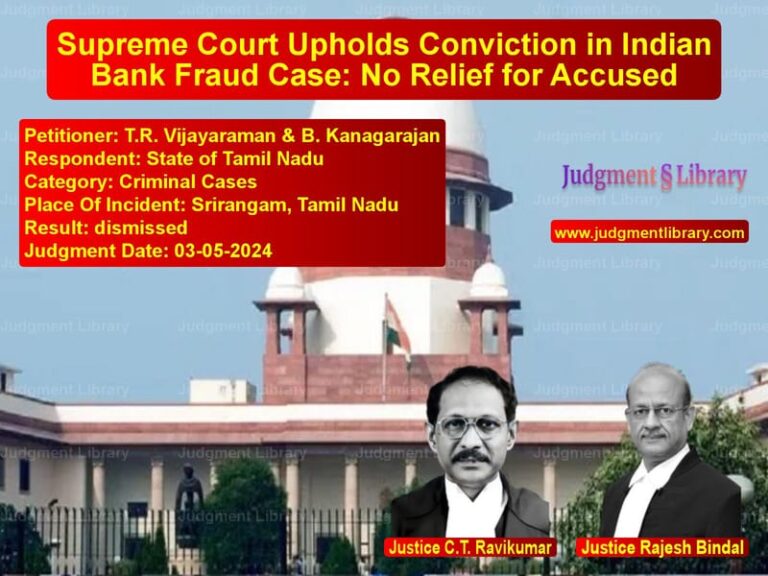Right to Die with Dignity: Supreme Court Revises Guidelines on Advance Medical Directives
The landmark case of Common Cause (A Regd. Society) vs. Union of India dealt with the fundamental issue of whether an individual has the right to refuse life-sustaining treatment in cases of terminal illness. This case, which originally resulted in a ruling in 2018, was revisited in 2023 due to practical challenges in implementing the directives laid down earlier. The Supreme Court, in its judgment dated January 24, 2023, modified the previous guidelines to ensure a more practical framework for Advance Medical Directives (AMD) and end-of-life care decisions.
Background of the Case
The judgment of Common Cause vs. Union of India in 2018 recognized the right to die with dignity as a fundamental right under Article 21 of the Constitution. The Court had issued detailed guidelines on Advance Medical Directives and passive euthanasia, ensuring that individuals could exercise autonomy over their medical treatment in terminal conditions.
However, after the implementation of these directives, it was brought to the Court’s attention that several procedural hurdles were preventing their practical execution. The Indian Society of Critical Care Medicine filed an application seeking clarification and modification of the 2018 judgment.
Key Legal Issues
- Are the procedures for executing an Advance Medical Directive too cumbersome?
- Should modifications be made to ensure easier implementation of end-of-life care decisions?
- How can the medical community and legal authorities work together to ensure patient autonomy while preventing misuse?
Petitioner’s Arguments
The Indian Society of Critical Care Medicine argued that:
- The procedures outlined in the 2018 judgment were too complex and bureaucratic.
- Requiring the countersignature of a Judicial Magistrate of First Class (JMFC) created unnecessary delays.
- Medical professionals faced challenges in implementing the guidelines, causing distress to patients and their families.
- There should be a more streamlined approach to ensure that Advance Medical Directives are accessible and practical.
Respondent’s Arguments
The Union of India contended that:
- The 2018 judgment provided adequate safeguards to prevent misuse of AMDs.
- Any modifications should ensure that decisions to withdraw life support are not taken hastily.
- There was a need to balance patient autonomy with ethical medical practices.
Supreme Court’s Observations
The Supreme Court, comprising Justice K.M. Joseph, Justice Ajay Rastogi, Justice Aniruddha Bose, Justice Hrishikesh Roy, and Justice C.T. Ravikumar, made the following key observations:
“The right to die with dignity is an essential aspect of the right to life under Article 21. However, the procedural complexities outlined in the 2018 judgment have made it difficult for individuals to exercise this right effectively. We, therefore, find it necessary to modify certain provisions to make the process more practical.”
Read also: https://judgmentlibrary.com/rti-and-collegium-decisions-supreme-courts-verdict-on-disclosure/
Key Modifications to the 2018 Guidelines
The Court introduced the following changes:
- Instead of requiring authentication by a Judicial Magistrate of First Class (JMFC), Advance Directives can now be attested before a Notary Public or a Gazetted Officer.
- The requirement for storing AMDs in court registries has been removed. Instead, copies should be provided to family members, physicians, and municipal authorities.
- The process for forming Medical Boards to assess AMDs has been simplified:
- A Primary Medical Board (consisting of the treating doctor and two specialists) will first examine the patient.
- If confirmed, a Secondary Medical Board (appointed by the district’s Chief Medical Officer) will verify the decision.
- The time frame for decision-making by medical boards has been shortened to 48 hours to avoid unnecessary delays.
- The role of the family physician or the next of kin has been emphasized, ensuring that they play a part in decision-making if the patient is incapacitated.
Final Ruling
The Supreme Court ruled that:
- The 2018 guidelines were too cumbersome and needed modification.
- The revised guidelines must be followed by all medical practitioners and hospitals.
- The changes ensure that the right to die with dignity is respected while maintaining safeguards against misuse.
Implications of the Judgment
This ruling has significant implications:
- Practical Implementation: Hospitals and doctors now have a clearer, more efficient process for executing AMDs.
- Strengthening Patient Autonomy: Ensures that patients have more control over end-of-life decisions.
- Reduced Legal and Administrative Hurdles: Simplifies the process, making it easier for families to respect a patient’s wishes.
Conclusion
The Supreme Court’s decision in Common Cause vs. Union of India marks a significant step in ensuring that individuals can exercise their right to refuse life-sustaining treatment with dignity. By modifying the procedural aspects of the 2018 ruling, the Court has struck a balance between patient autonomy and medical ethics, making it easier for individuals and medical practitioners to implement Advance Medical Directives without unnecessary legal barriers.
Read also: https://judgmentlibrary.com/supreme-court-orders-review-of-fake-pharmacists-case-in-bihar/
Petitioner Name: Common Cause (A Regd. Society).Respondent Name: Union of India.Judgment By: Justice K.M. Joseph, Justice Ajay Rastogi, Justice Aniruddha Bose, Justice Hrishikesh Roy, Justice C.T. Ravikumar.Place Of Incident: India.Judgment Date: 24-01-2023.
Don’t miss out on the full details! Download the complete judgment in PDF format below and gain valuable insights instantly!
Download Judgment: common-cause-(a-regd-vs-union-of-india-supreme-court-of-india-judgment-dated-24-01-2023.pdf
Directly Download Judgment: Directly download this Judgment
See all petitions in Fundamental Rights
See all petitions in Public Interest Litigation
See all petitions in Separation of Powers
See all petitions in Constitution Interpretation
See all petitions in Judgment by K.M. Joseph
See all petitions in Judgment by Ajay Rastogi
See all petitions in Judgment by Aniruddha Bose
See all petitions in Judgment by Hrishikesh Roy
See all petitions in Judgment by C.T. Ravikumar
See all petitions in allowed
See all petitions in Modified
See all petitions in supreme court of India judgments January 2023
See all petitions in 2023 judgments
See all posts in Constitutional Cases Category
See all allowed petitions in Constitutional Cases Category
See all Dismissed petitions in Constitutional Cases Category
See all partially allowed petitions in Constitutional Cases Category

